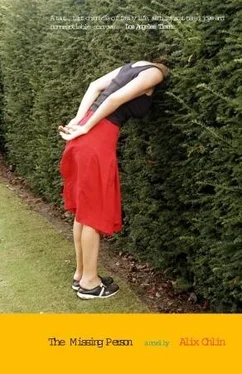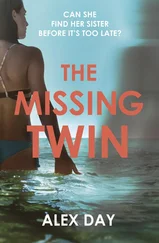“Unlisted costs extra,” he said, leaning his forehead against the steering wheel. “Nobody ever calls.”
“Maybe you should look into advertising,” I said.
“What did you say?”
“I said I was looking for you. I said I needed some plumbing done.”
“You didn’t.”
“I told him who I was.”
“Told who?”
“Gerald.”
“How’d you know it was him?”
“I guessed,” I said, “on the basis of the fact that it sounded just like him.”
A smile broke over him then, and he shook his head and turned on some music. Frank asked luck to be a lady tonight, and Angus sang along.
I was nervous about going into Wylie’s apartment — having ducked out of their tunnel — and stuck my hand in Angus’s when we walked inside. He squeezed, then let go. Stan and Berto glanced up, looking unaffected by their stint in jail. I asked how they were doing, and Stan said, “We’re out on our own recognizance.” Sledge dutifully licked my hand. Irina smiled at me and said, “Look who’s here, Psyche,” and the baby stared at me as if I were a stranger. So, for that matter, did Wylie. Everybody was sitting around talking, and to my surprise nobody seemed distressed by their failure to keep people off the mountain for very long. They wanted to know if I’d seen their “event” on the news and made fun of Panther for being such a media hog. Every face had a rosy glow. Even Wylie looked happier than I’d seen him in ages.
Now they were talking about whether to take the day off. Wylie was against it, arguing that “the revolution doesn’t come with vacation time, ” but was outvoted and backed down with little protest, which I took as a sign of how good he was feeling. Stan and Berto wanted to hang out and drink beer, and the rest of us decided to go for a hike.
Angus drove. The sun shone with a riotous purity, picking out sparks of bright metal in the streets and glinting off cars, the world seemingly lit and mineral, rampant with gems.
We stopped at a grocery store near the university, where shopping carts were scattered across the asphalt expanse of the parking lot. Angus and Wylie got out. A man in a cowboy hat was leaning against the Pepsi machine outside the sliding doors, panhandling. I watched Irina change Psyche’s diaper in the backseat, putting the dirty one in a plastic bag from the back of the van.
“I take it you don’t use disposables,” I said.
“Goodness no! I’ll clean that one when we get into the mountains.”
“Oh,” I said.
“Lynn,” Irina said gently, “there is shit in nature. Humans shit. Animals shit.” In her accent it sounded like “sheat,” and somehow more elegant.
“I know, I know,” I said, leaning back in my seat and closing my eyes.
“What we have to get away from,” Irina said, settling herself and the baby in the back, “is this idea that we are separate from nature. We are natural too, with bodies and smells, just like the animals do.”
I kept my eyes closed and listened to her lilting European intonations while ignoring the words of her harangue. Eventually I heard the car door open and felt a breeze rush into the van. “You should’ve seen that dumpster,” Wylie said. “A cornucopia of provisions. Cheetos, day-old muffins, melted cheese on pizza boxes.”
“Please say you didn’t get our picnic from a dumpster.”
“I was going to,” he said. “But Angus thought you’d prefer some first-time-use food.”
“Angus,” Irina said, “I think you are getting soft.”
“I know it,” Angus said, and started the car. Before long we were in Tijeras Canyon, the road winding between the mountains, Angus humming as we drove, Wylie and Irina chatting quietly in the backseat, Psyche gurgling along with them. I felt a tightening in my chest, heat and air compressing in my lungs, then realized what it was: I was happy.
On the road to the Crest the traffic was thinner and we swung around to the east side of the mountains, the trees now thick and green. Angus parked at a trailhead, and we started hiking.
Tiny brown birds flitted in the juniper scrub. Rustles in the underbrush, scissors of movement far ahead, glimpsed only out of the corner of your eye: the world narrowed to things like this. The sun beat down on the steep, rocky trail. I started to sweat, and my legs hurt. Irina was in front of me, her legs flexing with muscle as she climbed, and gradually she got farther and farther ahead. At a small lookout point I stopped to catch my breath, the mountain falling below me, banded with the switchback curls of the trail.
Then Angus stepped up beside me, holding out his Nalgene bottle. “You look like you could use some water.”
We smiled at each other, and I had a long drink. In the sunlight his skin looked blanched, white and shadowless, overexposed. I handed the bottle back and said, “I thought you said you always wear a hat.”
“Always,” he said, “except right now.”
“Hey!” Wylie shouted from up ahead, and we started back up the trail, which soon sank into shadow and was carpeted with pine needles. After a minute or two I saw bright swatches of clothing through the trees. Wylie and Irina were standing off the trail, looking at a washing machine, square, white, half-rusted, suspended on its side in the act of falling downhill. Its chrome dials were black, absent any markings or instructions. A word I’d always liked in high school ambled into my brain: “erratic,” the word for boulders swept into new territories by the movements of glaciers.
“How do you think it got here?” Irina said.
“Somebody dumped it,” my brother said. He tried opening the lid, but it wouldn’t budge.
“Litterbug,” I said.
Wylie found a stick, wedged it under the lid, and lifted it, releasing a terrible, thick, sick-making smell. I backed away and covered my mouth with the tail of my shirt.
“Oh, no,” Irina said. She covered up the baby and moved well up the trail, and I followed. But the smell was still with us, so I motioned for her to keep going. I didn’t know what Wylie and Angus were doing back there, and didn’t care. Finally we stopped in a sunny place where the air smelled fresh and waited for them.
“What was it?” Irina asked when they caught up with us.
Wylie was looking at Psyche. “It was a cat,” he said.
“With kittens,” Angus added.
“What? How did a cat get in there?”
“I think it got dumped with the machine,” Angus said. “At the same time.”
“But that machine’s all rusted,” I said. “Wouldn’t the cat already be, you know, disintegrated?”
“Oh, dear,” Irina said.
“That’s what I said,” Wylie said.
“But with the door closed,” Angus said, “it’s almost a seal. That would slow down the process.”
“But it wasn’t a seal,” my brother said, “because there was rotting.”
“I said almost.”
“I don’t know, Angus,” Wylie said. “I think the cat was feral. It just climbed in there to have its kittens, then the door slammed shut and trapped them.”
They stood there for a few minutes, calmly discussing the chemistry of rot, the population of feral cats in the Sandias, recent weather patterns and their likely effect on corpses in the wild. I started to feel sick again, and, without speaking, I took off up the trail, my stomach churning.
Wylie caught up to me and we hiked together without saying anything.
“What did it look like?” I asked him after a while.
“You don’t want to know,” he said.
Looking at him, I thought about the animals piled up in the pale blue basin of the old washing machine; I thought also of a famous painting I’d once seen, an elegant oil of a hare on a wooden table, dribbling fresh blood, in a gilt frame. Irina’s words about shit ran through my mind, and so did the naked self-portraits and paintings executed with menstrual blood I’d studied, and Eva Kent’s paintings, and so, finally, did the face of my father as he lay in the coffin my mother had chosen, recognizably himself and yet not, his skin plumped with embalming fluid and his cheeks rouged with the undertaker’s makeup. You can celebrate the body all you want, I thought, you can sing hymns to its presence, its shit and stink, but it will only ever betray you in the end. I touched Wylie’s arm.
Читать дальше












